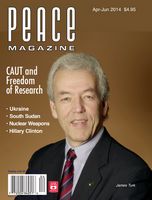
Peace Magazine Apr-Jun 2014, page 4. Some rights reserved.
Search for other articles by Metta Spencer here
The Ukraine crisis was avoidable. The EU (mainly Germany) unwisely tried to seduce Ukraine away from her Russian family as a cheap date, just while Putin had lots of power: Ukraine’s economy would die without its Russian market. It depends on Russian gas and owes Russia $16 billion. The EU, even with IMF help, is too broke (and too dependent on Russian trade) to help Ukraine much. And Russia is not going away. Ukraine will have to get along with it somehow, even if Putin is a thug, which he certainly is. Russia, lacking geographic barriers to European invaders, needs a buffer. Ukraine may enjoy enough autonomy to stay neutral and even clean up its corruption, but not enough to join the West. Everyone could have foreseen that.
Besides, this was no Orange Revolution. When we phoned old friends (democracy activists) in Kiev, they said they had stopped going to the Maidan weeks before, since it was not nonviolently disciplined. If a civil resistance movement condones violence, it loses all chances for democracy. When an agreement was negotiated that would have left Yanukovych in power until an early election, the Maidan rejected it. Yanukovych fled and Putin sent troops into Crimea, inviting its people home to Mother Russia.
The world needs a clear international law spelling out the conditions for separatism. Secession is almost always a bad idea, but what is even worse is the violence that so often ensues when it is at issue. The US says Russia is violating the law by encouraging Crimea’s secession but it has done the same thing many times itself. And Germany precipitated the wars in Yugoslavia by recognizing Croatia and Slovenia as independent states, over the objections of the other expert negotiators. Putin’s intervention was wrong but hardly unique. He may indeed deserve the “punishment” Obama is trying to inflict, but even without it, Russia will pay a high price.
The procedure was deplorable but the outcome-Crimea’s return to Russia-is not entirely bad. The majority of its inhabitants get what they (foolishly) want-a higher living standard under authoritarian rule. Their departure may enable Ukraine’s new leaders to find common ground on which to base their domestic policies and placate the neighboring states.
That will be hard. Putin promises to accept them only as a neutral federation. Even Kissinger and Brzezinski advise them to “Finlandize” Ukraine. In theory, federalism might reduce the conflicts between Ukrainians of the west versus those of the south and east. In reality, it might give Putin more opportunity to foment opposition within the latter group.
So far, Putin (damn him!) is winning. Obama seems to be the only Western political leader who refuses to face that fact and who seeks revenge. But the continuing polarization, the new Cold War, will make it harder for Ukraine to accommodate all its angry stakeholders. It will make it harder for Obama too, especially when he needs Russian cooperation to solve the conflicts with Syria and Iran. And it will make it harder for democrats and journalists in Russia, who are being even more openly repressed than before.
What might help-another “reset”? Fat chance. But let’s all think about it.

Peace Magazine Apr-Jun 2014, page 4. Some rights reserved.
Search for other articles by Metta Spencer here